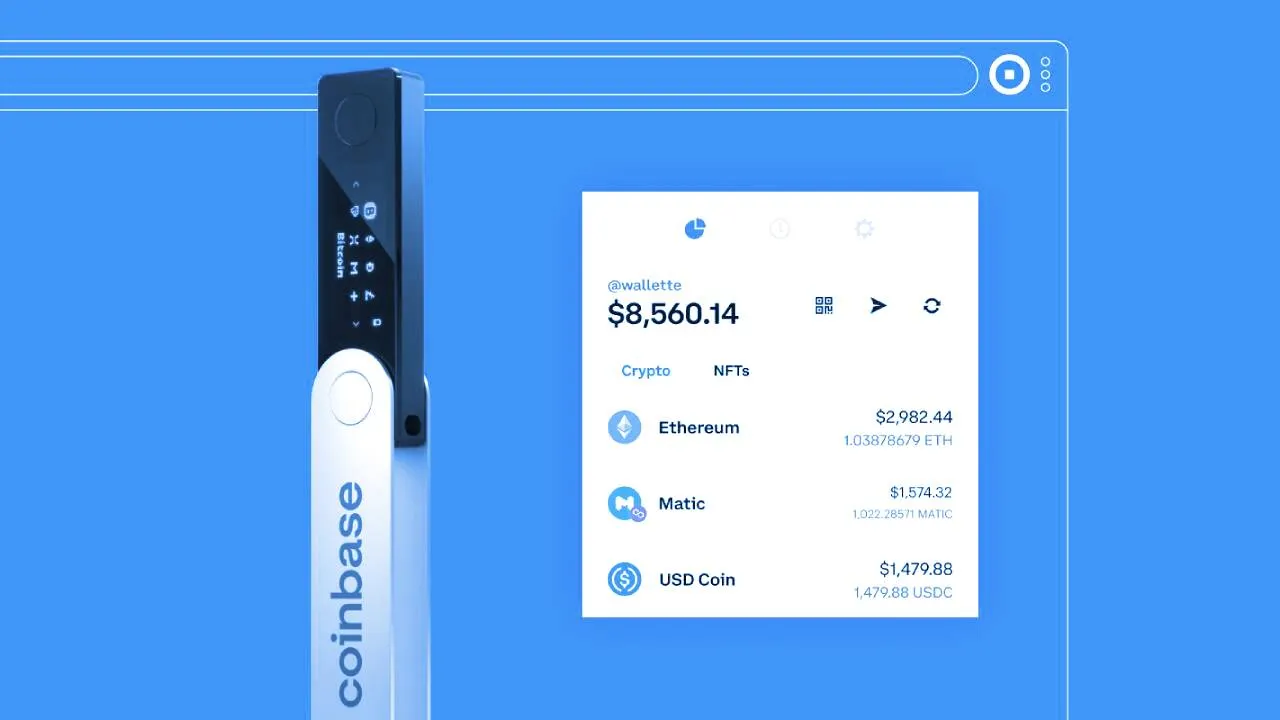Coinbase, the largest crypto exchange in the U.S. in terms of trading volume, today announced that it would support Ledger, a popular crypto hardware wallet.
The Ledger wallet integration is now available through the Coinbase wallet browser extension, providing users with an additional layer of security.
The move comes at the time when adoption for non-fungible tokens (NFTs), decentralized finance (DeFi), and the broader crypto industry is gaining serious momentum.
"There's no future in Web3 without security at the start of the consumer journey," Charles Hamel, the vice president of product at Ledger, told Decrypt. "With billions of transactions happening every month, no matter what or why you trade and hold, we believe every user deserves world-leading security and ease-of-use. Coinbase and Ledger partnering enhances this for crypto and NFT communities."
Hardware wallets are physical devices designed to store users' private keys offline instead of keeping them online, in so-called hot wallets like those offered by centralized entities such as exchanges. Private keys are a critical piece of information required to authorize transactions on blockchain networks such as Bitcoin or Ethereum, but when stored online, they are susceptible to thefts and hacks.
For example, the August 2016 Bitfinex hack, one of the most notorious security incidents in the history of the crypto industry, which resulted in a theft of almost 120,000 Bitcoin, happened through a vulnerability in the exchange's hot wallets.

Bitfinex Hack and Bitcoin Laundering Scheme Coming to Netflix
The teams behind "Tiger King" and the Fyre Festival documentary "FYRE" are joining forces to produce a new series for Netflix based on the true-life story of Ilya "Dutch" Lichtenstein and Heather Morgan, who were arrested this week and stand accused of conspiring to launder around $4.5 billion in Bitcoin. The government seized $3.6 billion of that total. Netflix announced today it has green-lit a documentary series about the couple, who allegedly tried to launder the ill-gotten funds from the 20...
"We want to empower everyone to use dapps and access Web3, and that requires building the easiest-to-use and most accessible self-custody wallet in the ecosystem," Coinbase said.
As explained by Coinbase, since every transaction on the blockchain requires both a user's public and private keys, a "hardware wallet ensures that only the user who holds the physical device can complete a transaction."
"Using a hardware wallet is a lot like using two-factor authentication to secure a website login, but instead of a six-digit code that is sent as an SMS or generated in an authenticator app, your hardware wallet is used to physically confirm transactions with the press of a button," said Adam Zadikoff, senior product manager at Coinbase.
Coinbase and Ledger
Coinbase first announced its partnership with Ledger in December last year with the launch of a co-branded crypto debit card which was pitched as a gateway to the world of crypto for new users.
The initiative is part of a broader push by the Paris-based company to transform itself from a physical device maker into a crypto platform that revolves around its software application known as Ledger Live.

Ledger Launches Crypto Debit Card
Crypto hardware-maker Ledger announced on Thursday the launch of a debit card that will let users spend their crypto directly or use it as collateral for cash purchases. The new debit card, which will be available early next year, is part of a broader effort by Ledger to transform itself from a device maker into a crypto platform that revolves around its software application, Ledger Live. While most crypto owners store their currency in an online wallet, companies like Ledger and rival Trezor ma...
"In the same way as the iPhone is a platform for Web2, Ledger is for Web3," Ledger CEO Pascal Gauthier told Decrypt at the time.
According to Coinbase, the company has "ambitious plans" that will see it support more types of hardware wallets in the future—not only in the Coinbase Wallet extension but with Coinbase mobile apps as well.
"For anyone dabbling in NFTs or DeFi, hardware wallets are a gold standard for keeping your assets secure," Sid Coelho-Prabhu, group product manager at Coinbase, told Decrypt. "We're excited to combine the delightful user experience of Coinbase Wallet with the security of Ledger hardware wallets to create the best Web3 offering in crypto today."




